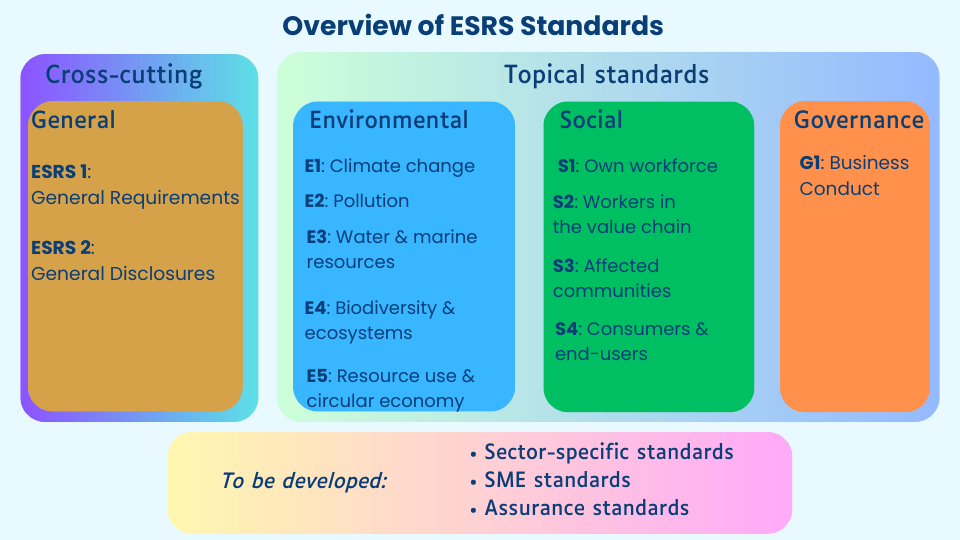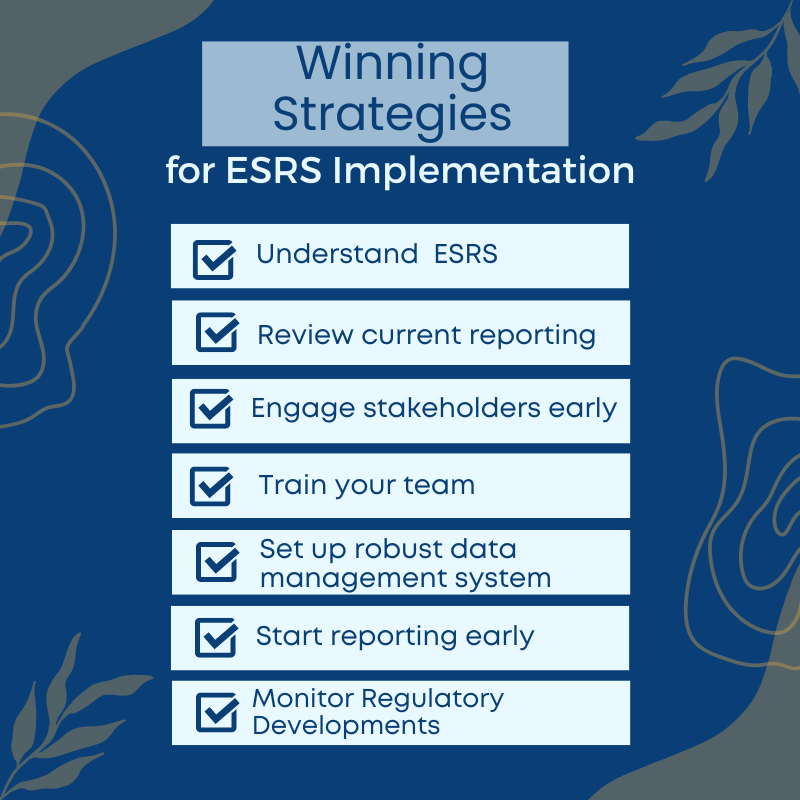In a world increasingly focused on sustainability and responsible business practices, how companies report their environmental, social, and governance (ESG) performance has never been more important. The European Sustainability Reporting Standards (ESRS) provide a key framework for businesses in this critical field. These twelve standards are set to revolutionize the transparency and consistency of sustainability reporting, ultimately driving a more sustainable future for us all.
What are the European sustainability reporting standards?
Developed by the European Financial Reporting Advisory Group (EFRAG) in 2022, the draft ESRS is a set of twelve standards designed to enable organizations to report their sustainability performance in a clear and standardized manner. Adopted by the European Commission on July 31, 2023, these mandatory standards promise to bring quality and comparability to sustainability reporting across the continent.
Adopting a double materiality approach, the ESRS requires companies to report both their impact on the environment and people as well as how they can be affected by the external world. These forward-looking standards mandate businesses to disclose their plans, goals, and targets for enhancing sustainability performance. The ESRS also aligns with the Task Force on Climate-related Financial Disclosures (TCFD) recommendations, echoing a comprehensive approach to sustainability reporting.
The ESRS also encourage companies to report on their whole value chain. To streamline reporting in accordance with the EU Taxonomy, companies must include their environmental matters aligned with the EU Taxonomy as a vital component of their sustainability reporting. The ESRS are expected to complement existing sustainability reporting frameworks, such as the Global Reporting Initiative (GRI).
Key Features of the ESRS
The ESRS have a number of key features, including:
• They are based on a double materiality approach, which means that companies are required to report on both their material financial and sustainability impacts.
• They are aligned with the Task Force on Climate-related Financial Disclosures (TCFD) recommendations.
• They are designed to be forward-looking, requiring companies to disclose their plans and targets for improving their sustainability performance.
• They are comprehensive, covering a wide range of sustainability matters.
What will the EFRAG sustainability reporting standards mean for businesses?
The introduction of the first set of ESRS standards is expected to significantly affect businesses operating within the European Union. The ESRS is a framework that aims to provide guidance for companies to report on their environmental, social, and governance (ESG) performance, at both the entity and value chain level.
The adoption of these reporting standards would further strengthen the harmonization of global sustainability reporting and provide EU companies with a clear and concise way of reporting their ESG performance. Ultimately, the ESRS reporting standards will help to move the EU towards a more sustainable future, whilst also providing economies with a clear and concise way of demonstrating their ESG performance, building trust with stakeholders, and promoting their brands.
For more detailed discussions on what the ESRS means for businesses, check out our blogs “The Implications of the European Sustainability Reporting Standards (ESRS) for Businesses” and “ESRS: An Opportunity or a Challenge for Companies Operating in the EU?”
An Essential Overview of the 12 ESRS Standards
Below is a brief overview of the first 12 ESRS standards. We will further discuss these standards in detail in our future blogs.

Cros-cutting or General Standards:
ESRS 1: General Requirements sets out the general requirements for sustainability reporting. It covers topics such as the scope of reporting, qualitative characteristics of information, crucial concept of double materiality, sustainability due diligence, value chain information, the presentation of sustainability information, and more.
ESRS 2: General Disclosures requires companies to disclose a range of general information about their sustainability performance. This information includes information about the company’s governance, strategy impact, risk and opportunity management, and metrics and targets.
It is important to note that disclosures in ESRS 2 are always mandatory regardless of the outcome of the double materiality assessment.
Environmental Standards
ESRS E1: Climate Change requires companies to disclose information about their climate change-related impacts, risks and opportunities. This information includes information about the company’s greenhouse gas emissions, its adaptation and mitigation strategies, and its exposure to climate-related financial risks.
ESRS E2: Pollution requires companies to disclose information about their pollution-related impacts, risks and opportunities. This information includes information about the company’s emissions of air pollutants, water pollutants, pollution of soil and hazardous substances.
ESRS E3: Water and Marine Resources requires companies to disclose information about their use of water and marine resources. This information includes information about the company’s water consumption, its wastewater treatment, and its impact on marine ecosystems.
ESRS E4: Biodiversity and Ecosystems requires companies to disclose information about their impact on biodiversity and ecosystems. This information includes information about the company’s use of natural resources, its impact on wildlife, and its contribution to deforestation.
E5: Resource Use and Circular Economy requires companies to disclose information about their use of resources and their contribution to the circular economy. This information includes information about the company’s waste management practices, its use of recycled materials, and its efforts to reduce its environmental impact.
Social Standards
ESRS S1: Own Workforce requires companies to disclose information about the impact of their operations on their own workforce. This information includes information about the company’s employment practices, characteristics of its employees, its pay and benefits, and more. ESRS S1 is the most comprehensive social standard in this set with 17 disclosure requirements.
ESRS S2: Workers in the Value Chain requires companies to disclose information about the impact of their operations on workers in their value chain. This information includes information about the company’s procurement practices, its labor standards, and its efforts to combat forced labor and human trafficking.
ESRS S3: Affected Communities requires companies to disclose information about the impact of their operations on affected communities. This information includes information about the company’s community relations, its investments in local communities, and its efforts to mitigate its negative impacts on local communities.
ESRS S4: Consumers and End-Users requires companies to disclose information about the impact of their products and services on consumers and end-users. This information includes information about the company’s product safety, its environmental impact, and its efforts to promote sustainable consumption.
Governance Standard
ESRS G1: Business Conduct requires companies to disclose information about their corporate governance and business conduct. This information includes information about corporate culture, management of relationships with suppliers, anti-corruption and anti-bribery measures, political influence and lobbying, protection of whistleblowers, animal welfare, and payment practices, especially with regards to late payment to small and medium enterprises (SMEs).
The Potential Impact of ESRS
The implementation of ESRS is set to offer myriad benefits for businesses, investors, and society as a whole. Improved transparency and accountability rank high among these advantages. By setting a clear framework for reporting, ESRS will allow stakeholders to compare and contrast the sustainability performance of different companies, enhancing overall market transparency.
Adopting the ESRS could also boost a company’s reputation, attract capital, inform decision-making, and potentially reduce costs. Clear reporting of sustainability performance can position a company as a responsible and forward-thinking organization, appealing to the growing base of socially conscious investors and customers.
Conclusion
With the adoption of ESRS, Europe is taking a substantial leap in standardizing sustainability reporting. This development promises to improve the quality of reporting, providing investors and stakeholders with clear, comparable data. It also empowers companies to clearly communicate their sustainability journey, effectively managing reputational risks and unlocking new opportunities.
To prepare for this shift, companies should familiarize themselves with the ESRS, evaluate their current reporting practices, and train their teams accordingly. Keep abreast of updates on the EFRAG website and be ready to reshape your sustainability reporting process.
In the new era of corporate responsibility, the ESRS could well be the guiding light towards more sustainable and transparent business practices.
Your Next Step on the CSRD Compliance Journey
Are you ready to spearhead your company’s sustainability journey and stand out from the crowd? The Corporate Sustainability Reporting Directive (CSRD) and European Sustainability Reporting Standards (ESRS) are not only coming but are here, and your next steps are critical.
Mastering the complexities of the CSRD and ESRS can seem like a daunting task. However, overcoming this challenge doesn’t just mean compliance with new laws – it’s an opportunity to show your commitment to a sustainable future, to gain a competitive edge, and to attract stakeholders who value responsibility.
We know it might be overwhelming, but you’re not alone in this journey. Imagine having all the necessary tools, knowledge, and support at your fingertips. That’s where The CSRD Compass steps in. We’re your ultimate guide to everything CSRD and ESRS, offering a rich collection of resources ranging from detailed guides and insightful articles to comprehensive courses and expert analysis. Navigating this new terrain of sustainability reporting has never been easier!
Don’t wait for tomorrow. The time to act is now. Embark on your sustainability reporting journey today, prepare your business for a sustainable future and make a real impact on our planet. Visit The CSRD Compass today, and let’s shape a greener future together!


